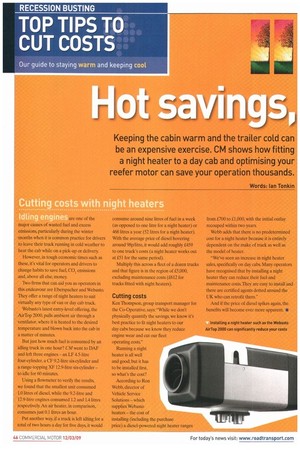Keeping the cabin warm and the trailer cold can be
Page 46

If you've noticed an error in this article please click here to report it so we can fix it.
an expensive exercise. CM shows how fitting a night heater to a day cab and optimising your reefer motor can save your operation thousands.
Words: Ian Tonkin
Cutting costs with night heate..
1 are one of t major causes of wasted fuel and excess emissions, particularly during the winter months when it is common practice for drivers to leave their truck running in cold weather to heat the cab while on a pick-up or delivery.
However, in tough economic times such as these, it's vital for operators and drivers to change habits to save fuel, CO, emissions and, above all else, money.
Two firms that can aid you as operators in this endeavour are Eberspacher and Webasto. They offer a range of night heaters to suit virtually any type of van or day cab truck.
Webasto's latest entry-level offering, the AirTop 2000, pulls ambient air through a ventilator, where it is heated to the desired temperature and blown back into the cab in a matter of minutes.
But just how much fuel is consumed by an idling truck in one hour? CM went to DAF and left three engines— an LF 4.5-litre four-cylinder, a CF 9.2-litre six-cylinder and a range-topping XF 12.9-litre six-cylinder — idle for 60 minutes.
sing a flowmeter to verify the results. we found that the smallest unit consumed 1.0 litres of diesel, while the 9.2-litre and 12.9-litre engines consumed 1.2 and 1.4 litres respectively. An air heater, in comparison, consumes just 0.1 litres an hour.
t another way. if a truck is left idling for a of i hours a day for five days, it would consume around nine litres of fuel in a week (as opposed to one litre for a night heater) or 468 litres a year (52 litres for a night heater). With the average price of diesel hovering around 98p/litre, it would add roughly £459 to one truck's costs (a night heater works out at £51 for the same period).
Multiply this across a fleet of a dozen trucks and that figure is in the region of £5,000, excluding maintenance costs (£612 for trucks fitted with night heaters).
Cutting costs
Ken Thompson, group transport manager for the Co-Operative, says: "While we don't physically quantify the savings, we know its best practice to fit night heaters to our day cabs because we know they reduce engine wear and cut our fleet operating costs."
Running a night heater is all well and good; but it has to be installed first. so what's the cost?
According to Ron Webb, director of Vehicle Service Solutions — which supplies Webasto heaters — the cost of installing (including the purchase price) a diesel-powered night heater ranges from £700 to £1,000, with the initial outlay recouped within two years.
Webb adds that there is no predetermined cost for a night heater because it is entirely dependent on the make of truck as well as the model of heater.
"We've seen an increase in night heater sales, specifically on day cabs. Many operators have recognised that by installing a night heater they can reduce their fuel and maintenance costs. They are easy to install and there are certified agents dotted around the UK who can retrofit them."
And if the price of diesel spikes again, the benefits will become ever more apparent. •
Installing a night heater such as the Webasto Ahlop 2000 can significantly reduce your costs




















































































































































